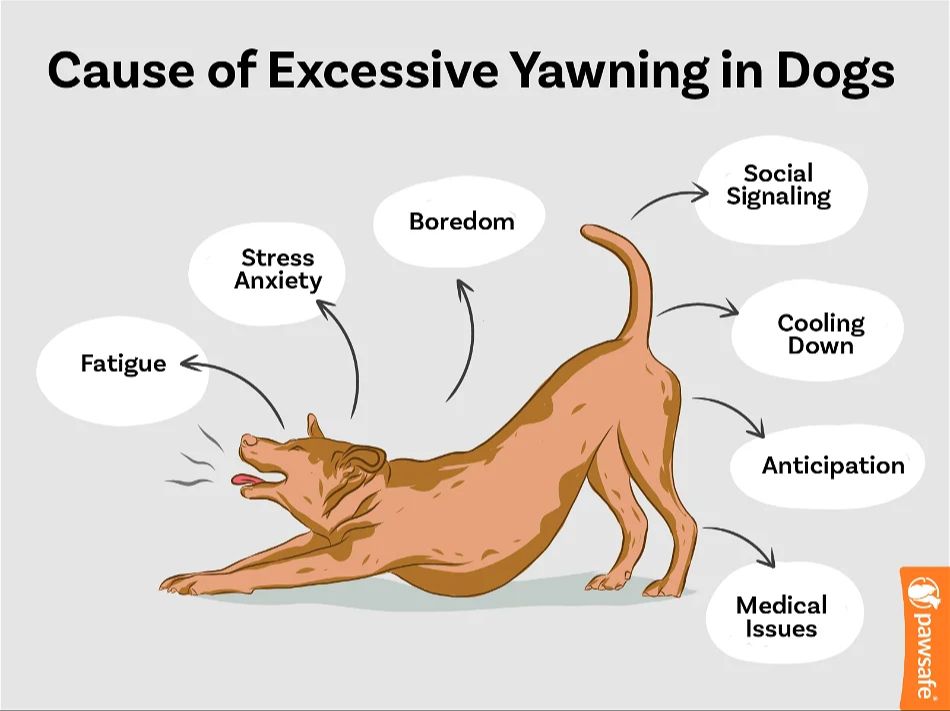Why Does My Dog Keep Yawning?
If your dog has been yawning more than usual, you may be wondering if something is wrong. Excessive yawning in dogs can be caused by a variety of factors, ranging from behavioral to medical.
In this article, we’ll explore some of the most common reasons dogs yawn frequently, including anxiety, fatigue, pain, and illness. We’ll also provide tips on how to tell if your dog’s excessive yawning requires a vet visit.
While the occasional yawn is perfectly normal, understanding the potential causes behind constant yawning can help you identify any issues your pup may be experiencing.
Normal Yawning
Yawning is a normal behavior for dogs that serves several purposes. Dogs tend to yawn when they are tired, bored, or transitioning between activities. Yawning may also be a self-calming behavior in response to stress. According to PetMD, the average healthy dog may yawn 10-20 times per day, with increased frequency at night when winding down.1
Yawning helps open up a dog’s airways and allows for deeper breaths, which can be calming. It also promotes an alert and awake state when transitioning from sleep. Normal yawning frequency will vary based on the dog’s age, breed, energy level, and routine. For example, puppies and high energy dogs may yawn more frequently. Most dogs yawn after waking up from a nap or when anticipating bedtime at night. Yawning throughout the day may indicate boredom or the need for mental stimulation.
Excessive and prolonged yawning, however, can signal an underlying medical or behavioral issue. Knowing the difference between normal and abnormal yawning is important for pet owners.
Excessive Yawning as a Symptom
While the occasional yawn is normal for dogs, excessive or frequent yawning can signal an underlying medical issue. Frequent yawning is generally defined as yawning more than 3 times per minute or yawning episodes lasting more than 3 minutes (source).

Some potential illnesses that are associated with excessive yawning in dogs include:
- Liver disease – yawning can be a sign of hepatic encephalopathy, which affects brain function due to liver damage (source)
- Kidney disease – excessive yawning may indicate nausea associated with kidney failure (source)
- Neurological disorders – conditions like distemper, epilepsy, and brain tumors can cause repetitive yawning (source)
- Pain – yawning can be a reaction to discomfort or internal pain
- Medication side effects – some medications like phenobarbital may trigger repetitive yawning
Medical Causes
Excessive yawning in dogs can sometimes be a sign of an underlying medical issue. Some potential illnesses that may lead to frequent yawning include:
Respiratory infections: Conditions like kennel cough or pneumonia can make it difficult for dogs to breathe normally, resulting in yawning as a reflex to get more air. Symptoms include coughing, nasal discharge, fatigue, and fever. These are treated with antibiotics and rest.
Gastrointestinal issues: Nausea, bloating, and abdominal discomfort from conditions like gastroenteritis or inflammatory bowel disease can prompt yawning. Symptoms involve vomiting, diarrhea, and loss of appetite. Treatment depends on the specific diagnosis but may include dietary changes, antinausea medication, or steroids.
Neurological disorders: Diseases affecting the brain like encephalitis, meningitis, or distemper can cause neurological symptoms like excessive yawning. Seizures, balance issues, and behavior changes may also occur. Supportive care and medication to reduce brain inflammation are used.
Liver or kidney problems: Organ dysfunction impairs the body’s ability to remove toxins, which can build up and cause neurological symptoms like yawning. Additional signs include lethargy, increased thirst/urination, weight loss. Treatment involves fluid therapy, medications, and special diets.
Pain: Discomfort or injuries causing chronic pain can prompt yawning as a stress response. Other signs may include changes in activity level, appetite, or behavior. Pain medication, rest, physical therapy, or surgery can provide relief.
If a pet is yawning excessively, especially paired with concerning symptoms, a veterinarian should be consulted to pinpoint the underlying cause and guide proper treatment.
Stress and Anxiety

Yawning can be a sign that your dog is feeling stressed or anxious. Stress and anxiety can manifest in dogs in many ways, including repetitive behaviors like yawning, licking, and pacing. If your dog is yawning frequently without being tired or bored, it may be a sign they are feeling anxious about something in their environment.
There are several potential triggers for stress and anxiety in dogs:
- Loud noises like fireworks, thunderstorms, or construction sounds
- Being left alone or separated from their owner
- Travel like car rides or being in unfamiliar places
- Interactions with other animals or strangers
- Changes in routine
In addition to frequent yawning, signs your dog may be feeling stressed or anxious include:
- Pacing or shaking
- Hiding or seeking comfort
- Loss of appetite
- Aggression or other behavioral changes
- Excessive licking, chewing, or scratching
If your dog is displaying these signs in situations that would reasonably cause stress, anxiety may be the underlying cause. Consulting with your veterinarian can help identify the triggers and determine the best ways to minimize your dog’s anxiety.
Fatigue
Excessive yawning can signal tiredness in dogs, especially in older dogs. As dogs age, they tend to sleep more during the day. Senior dogs can sleep up to 18-20 hours per day, so excessive yawning is common as they wake up from naps or have trouble staying awake. Older dogs may also start to experience cognitive dysfunction or dementia, which can disrupt their sleep cycles and cause them to feel fatigued or sleepy during the day. Arthritis and joint pain can also make it difficult for senior dogs to get comfortable and sleep well at night. All of these factors can lead to excessive yawning throughout the day as a sign of fatigue in aging dogs.

Some sources suggest that the wide opening of the jaw during a yawn allows greater oxygen intake, which may help combat fatigue (https://www.rover.com/blog/why-do-dogs-yawn/). If an older dog seems excessively tired or lethargic along with frequent yawning, a veterinary exam is recommended to check for any underlying health issues.
Pain
Excessive yawning can sometimes indicate that a dog is experiencing pain or discomfort. This is because yawning is a calming signal that dogs use to self-soothe in stressful situations, and pain can certainly cause stress. According to the Assisi Animal Health blog, “Yawning is a calming mechanism in dogs, used in stressful situations to calm anxiety – and we all know that pain can certainly cause stress and anxiety.”
When a dog is yawning frequently, it’s important to look for signs of pain in the head, mouth, or joints. As noted by WellPets, “Dogs typically perform their wide, toothy yawns with no problems, but occasionally we can see signs of difficulty or even pain when opening the mouth.” This could indicate an issue with the teeth, gums, or jaw. Grey Muzzle also points out that “Other signals of stress include lip-licking, averting their eyes and even yawning. Don’t assume your dog is just tired when he yawns, as dogs will also yawn as a calming mechanism when in pain.”
Some common sources of pain that may cause excessive yawning include dental problems, arthritis, muscle strains, and injuries. If your dog is yawning frequently, examine their mouth carefully and feel their joints for signs of swelling or discomfort. It’s a good idea to have your vet take a look and determine if pain is the cause of the frequent yawning.
Medications
Some medications can cause excessive yawning as a side effect in dogs. Sedatives like benzodiazepines and gabapentin can lead to increased yawning. According to one source, Prozac can also cause yawning in dogs. The yawning is usually harmless, but check with your vet if it becomes excessive or bothersome.
Gabapentin in particular is known to potentially cause increased yawning when given to dogs. As explained by this source, gabapentin binds to calcium channels in the brain which can lead to sedation and excessive yawning. Thankfully the side effect is usually mild and temporary. If yawning continues, contact your veterinarian to discuss adjusting the dosage or trying a different medication.

In summary, consult with your vet if you notice increased yawning after starting your dog on a new medication, especially sedatives or anti-anxiety drugs. While usually harmless, excessive yawning can be a sign to adjust the dosage or try an alternative treatment.
When to See a Vet
If your dog is yawning excessively, it’s a good idea to take them to the vet, especially if the excessive yawning occurs alongside other concerning symptoms. Some signs that warrant a vet visit include:
- Frequent yawning that happens throughout the day
- Yawning accompanied by pacing, panting, trembling, or other signs of distress
- Excessive yawning at night or difficulty sleeping
- Yawning along with lethargy, weakness, or lack of appetite
- Yawning that coincides with a stressful event like boarding, moving homes, or addition of a new pet or family member
- Inexplicable weight loss
- Yawning plus vomiting or diarrhea
While some yawning is normal, excessive yawning can signal an underlying medical issue. It’s important to consult your vet, who can pinpoint the cause through diagnostic tests and advise on appropriate treatment options. Don’t hesitate to make an appointment if your dog displays frequent yawning and any other abnormal symptoms.
Conclusion
In summary, excessive yawning in dogs can be caused by a variety of medical conditions, from something as benign as fatigue or stress, to more serious issues like pain, neurological disorders, or medications. If your dog is yawning a lot more than normal, look out for other concerning symptoms like lethargy, appetite changes, coughing, or vomiting. These associated symptoms can help narrow down the potential causes and determine if a veterinary visit is needed.
While occasional extra yawns are usually nothing to worry about, persistent excessive yawning or yawning accompanied by other symptoms merits a trip to the vet. Early diagnosis and treatment can help provide relief for your dog and address any underlying medical issue. If your dog is otherwise acting normal, try to assess what may be causing anxiety or fatigue that could lead to more frequent yawning. Overall, pay attention to any major changes in yawning behavior along with other symptoms, and reach out to your veterinarian if anything concerns you about your dog’s health.